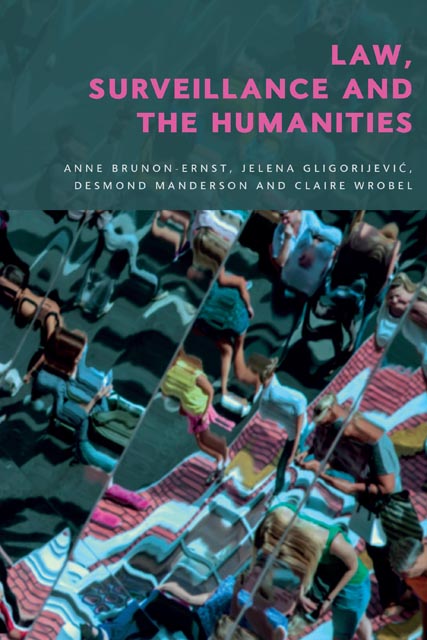13 - Gender and Surveillance in Margaret Atwood’s Novels, from Bodily Harm (1981) to The Testaments (2019)
Published online by Cambridge University Press: 18 November 2023
Summary
I. Introduction
Surveillance, as has been forcefully demonstrated in earlier chapters, does not apply indiscriminately. As Banita and Joy have argued in their discussions of race, the visual persists at its core, and the question of who is visible to whom is crucial. Similarly, surveillance is never gender blind, and visuality underlies the gendered experience of surveillance as much as it does its racialised exercise. Gendered dimensions of surveillance have nevertheless remained unexamined in the academic field, so much so that the title of a special issue of the Surveillance & Society journal published in 2009 claimed that ‘[s]urveillance studies needs gender and sexuality.’ This oversight is often traced back to Foucault's description of the ‘modern subject’ as a generic ‘he’ in Discipline and Punish. By contrast, the research which has been produced on gender and surveillance tends to focus on the ‘subjectivity and the experience of surveillance’ and to study ‘the local, the discursive, the performative and the embodied’. In a similar vein, van der Meulen and Heynen write that ‘[g]endering the field involves thinking about surveillance practices as socially located, as embodied and as having differential impacts’. This chapter adopts this proposed shift in perspectives to study gendered surveillance not in sociology but in fiction.
Why fiction? Literary fiction, through its instantiation power, offers a privileged means to study surveillance from the perspective suggested above. By focusing on the experience of surveilled subjects, fiction makes salient the surveillance effects which often remain elusive in social life. For instance, while providing a literary representation of databases is arguably quite a challenge, fiction can stage the struggles of individual characters when databases are the primary source of their social identity. Literature gives a perspective ‘from below’, offering readers a vicarious experience of environments which are exponentially saturated by surveillance – and in particular to observe the interpretative skills one develops in such a context – and drawing their attention to trends which are already present in their own societies. Rather than encouraging a wait-and-see attitude, fiction both stages resistance and develops its own literary modes of subversion, among which satire features prominently. As the chapter will make clear, Atwood is to some extent the heiress of early modern authors such as Swift, and of their textual strategies, highlighted by Tadié in Chapter 3 of this volume.
Why turn to Margaret Atwood's fiction to study the intersection of gender and surveillance?
- Type
- Chapter
- Information
- Law, Surveillance and the Humanities , pp. 252 - 272Publisher: Edinburgh University PressPrint publication year: 2023



